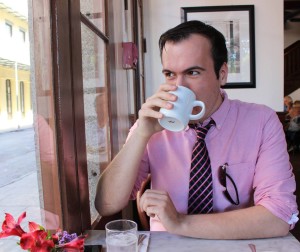“This is a marathon, not a sprint,” associate provost for international affairs David Fleshler explained regarding the internationalization of Case Western Reserve University.
Since the beginning of the fall semester, a wide array of programs for international students have emerged with the purpose of making CWRU an institution that is globally engaged. This includes the recruitment and sustention of international students, as well as opening the eyes of CWRU to a diverse and collaborative world.
Joining the university approximately a year and a half go, Fleshler, along with multiple other departments and administrators, have worked to make helpful programs available to international students. Such examples include the New International Student Orientation, Campus Community Forums, the International Friendship Families program, and the Spoken English Language Partners Program (SELP).
Bringing international students to the university prior to the arrival of domestic students, the International Student Orientation kicked-off the welcoming of foreign students to a new institution and country. “We have to make sure their specific needs are taken care of,” Fleshler said. “After all, they have needs that domestic students simply don’t have.”
Addressing questions from how to get a cell phone to how to open a bank account, the orientation’s goal was to provide a support structure for the new students. “For many of these first-years, it is their first time interacting with people outside of their home country,” he found. However, this is something that both international and domestic students have in common. “It is equally enriching for a U.S. student to have a relationship or friendship with an international student because they come to know something of a different culture,” he noted.
Another new addition for this year, a series of three campus community forums regarding international students and experiences were planned for the fall semester. The first, held in September, did not have a specific topic, so students, staff, and faculty were able to vocalize their own ideas regarding the globalization of CWRU and the international student experience. The second forum, held on Oct. 22, addressed international experiences and education abroad.
Positioned during International Education Week 2010, the third forum is scheduled for Nov. 19 at 12:30 in Nord Hall. The forum will be a discussion of international student recruitment, retention, and life on campus.
In an effort to improve international student life, the new International Friendship Families Program has also gone into effect this year. Led by its Steering Committee, the program recruits families with at least one member being an alumnus, faculty member, or staff member. Then, the families are paired with participating first-year international students. Each family is matched with one student, with an attempt to match based on similar interests between the family and student.
Explaining that the third matching event is set to take place this weekend, steering committee member Liz Woyczynski said that the first matching event took place on homecoming weekend and the second took place in the first weekend of November. “We currently have about fifty students and fifty families participating in the program,” she added.
Enjoying something as simple as a home cooked meal at their host families home or taking a sight seeing trip across Cleveland, the families provide students with a chance to get better acquainted with their new surroundings. “We are finding that our families enjoy meeting a young person and having the chance to contribute to their success,” Woyczynski said. “They enjoy being of help to the international students and the students have the opportunity to share their own culture as well.”
An international ambassador during international student orientation, senior undergraduate Wen Lei of Taiwan identifies with the program. “The Friendship Families program is a wonderful idea to partner the international students with a local American family. Through my personal experiences, the best way to learn English and American culture is spending time with a family,” she conveyed.
Moving from the country to the classroom, CWRU also contains programs that are helping international students academically. One such example is The Spoken English Language Partners Program (SELP) presented by Educational Services for Students.
Codirected by Dr. Jessica Gerard and Judith Olson Fallon, the program provides language partners to international students in order to improve that student’s English conversation and reading skills.
“We started the [SELP] program in response to the perceived need of our international students who did well in reading and writing but didn’t have the chance to interact with others,” Gerard explained. “We hope to help international students integrate into this [new environment]. They can use their language partners to help form a study group, talk about academics, discuss what book is being read in class that week, and gain skills to aid class participation,” she added.
The program also allows international students the chance to refine their understanding of the English language’s intricacies. “The language partners may work with an international student on some pronunciation issues, reading skills, and their spoken language in a comfortable setting so that students will feel comfortable speaking with their classmates,” Olson-Fallon noted.
“The language partners are funded by the Office of International Affairs and co-supervised by Educational Services for Students (ESS) and by the SAGES ESL Writing Program. Many of them have studied abroad or have worldly experiences, while others are international students themselves,” Gerard conveyed.
“[We are] happy to be collaborating with both the ESL Writing Program and the Office of International Affairs to provide academic support,” Olson-Fallon concluded.
Though advancing the globalization of CWRU on multiple fronts, the lack of financial aid for international students remains a hurdle yet to be overcome by the university. “Currently, international students do not receive any form of financial based aid from the university, so they pay the full tuition price [of] roughly $37,000 a year,” USG vice president for academic affairs Jared Hamilton articulated.“A total of 90 percent of students get some form of financial based aid from the university, either merit or need based or both. There is nothing preventing financial based aid for international students, except for budgetary reasons,” he added.
However, Hamilton is hopeful that the disparity will be solved in the near future as the capital campaign gathers money to help reduce student debt at CWRU. “The University has lost some talented international students because we do not offer any financial aid. Peer institutions offer small amounts of financial aid that are often enough to cause international students to transfer,” he concluded.
Given the financial aid gap, some international students remain frustrated with this university reality. “It might be true [that some] international students [have] families [with] the ability to send us here with paying the full tuition. [However,] some of the families struggle [because of] the global financial crisis,” Lei said.
“However, looking at other private universities in [the U.S.], they do have the ability to supply scholarships for international students, so why can’t Case do the same,” she asked. “After all, all of the international students are here to not only exchange and adopt the American culture, but we are here for a better education and to learn.”

















